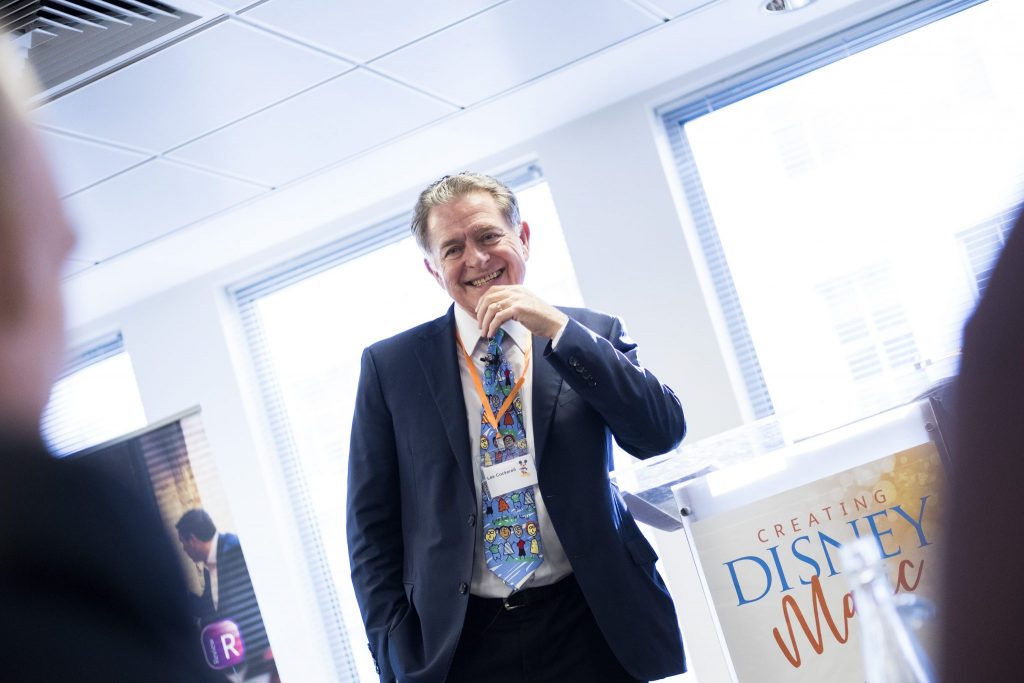

“In times of drastic change, it is the learners who inherit the future. The learned usually find themselves equipped to live in a world that no longer exists.”
As I continue my summary of Lee Cockerell’s leadership strategies (as described in his book Creating Magic) we come to his thoughts on the importance of continuous development for leaders. Indeed, Lee believes that all great leaders need to be lifelong learners.
In today’s ever-changing world, keeping up with the times is critical. This means being voracious in the pursuit of knowledge, paying attention to everything going on around you, and constantly expanding your frame of reference so you can improve your business with new and better ways of doing things.
Be a knowledge sponge
Legendary investment expert Warren Buffett says he spends much of his time during the day reading, not just corporate reports and business magazines but entire newspapers, books and other publications. Why? Because his decisions about potential investments are based not just on business news and data, but on information about the entire world. In my experience, great leaders keep up with what’s going on, not only within their own industries but also in the wider world.
If you want a competitive edge, read, read and read some more. Read industry publications, of course, but don’t stop there: read daily newspapers, subscribe to magazines, read novels and non-fiction books, search the web for blogs or articles in areas of personal interest.
Listen to the radio, listen to podcasts, listen to audiobooks while you’re doing other activities that can be mundane, such as brushing your teeth or getting ready in the morning! As I go about the business of living, I’ve learned to continually ask myself this question when something catches my eye: “If I were to take this idea and tweak it a bit, could it be applied effectively in my organisation or in some other area of my life?”
One example was when I saw wireless remote devices being used to speed up the checking of rental cars at the airport. I thought about how these could be used to eliminate one of the hassles that hotel guess often complain about: the front desk checking process. I thought “Why not check-in guests when they are on the bus from the airport so that the minute they arrive they can go straight to their rooms?”
When things are going well, it is easy to get complacent and start to fall behind the learning curve. So make your mind a sponge in good times as well as bad times, day in and day out, not just when you need to learn something specific.
Fill in your gaps
One of the seven habits in Stephen R. Covey’s hugely popular book The Seven Habits of Highly Effective People is called “Sharpen The Saw”. What Covey means is this: if you want to keep performing better, you need to persistently upgrade your skills and knowledge, just as you need to keep sharpening a saw when you’re cutting wood.
This needs to be an ongoing process, if your knowledge is not up-to-date or if you’re not as good at some aspects of your work as you could be, you need to sharpen that saw again and again.
Consider the four areas of competency covered in Strategy 2: Break the Mould.
- Technical competence
- Management competence
- Technological competence
- Leadership competence
Once you identify gaps in your repertoire, take immediate steps to fill them, and go about it energetically, methodically and diligently. Lee gave a personal example about improving his ability and confidence at public speaking. In that scenario his advice was:
- Don’t give speeches, tell stories
- Use personal examples, whether they’re about your family, your dog, or losing your bicycle!
- Never give a speech about a topic that you are not passionate about
- Never let anyone write a speech for you.
Like Lee Cockerell, I also frequently watch great speakers and learn from them, and pick up material for speeches by exposing myself to new information and fresh points of view.
Master business fundamentals
This is one area of knowledge that every leader and every aspiring leader needs to study. Even if your current responsibilities don’t include managing a budget or justifying an operating statement to stakeholders, someday you will understand what makes businesses tick, and that will make you a far better leader.
Don’t just learn about your own company, study entire industries and national and global economies as a whole. Sign up for a course. Take a class in finance. Study labour management issues, and learn how they relate to your industry. Read the business and finance sections of the newspaper every day.
Learn from the best
Find out who are the best doing what you do or what your team does, and study them. If there is an area of work that you feel you need to improve, find out who is good at it and learn from them.
Again, don’t just stick within your own industry or business, see what other organisations and industries are doing and what you can learn to adopt and adapt.
Lee told his managers to go to the best operations related to their areas of concern and look for better ways of doing things. Of course, we can learn new ideas by reading magazines, going to industry conferences and events, and you absolutely should do those things as much as possible. However, there is no substitute for hands-on experience.
Learn from your competitors
You and your company might be good, but so is your competition. And if it’s not, you can learn about what not to do.
Keep up with your colleagues
Maintain good and regular contacts with your professional colleagues. You never know when you might need a favour from them or vice versa. Cultivating professional contacts is like going to a lifelong school with a brilliant faculty that you can always turn to for knowledge.
Study your customer base
The most frequently asked question at Walt Disney World is “What time is the 3 o’clock parade?“ This is not a joke question; what the guests really mean is: “What time does the 3 o’clock parade get to this location?”
 As Disney trains Cast Members to know the Guests so well, everyone is trained to expect this question and no-one laughs when it comes up. Instead, everyone will say something like:
As Disney trains Cast Members to know the Guests so well, everyone is trained to expect this question and no-one laughs when it comes up. Instead, everyone will say something like:
It passes by here 12 minutes after three, and if you stand right over there, your child will have a great view of Cinderella.
It’s obvious an organisation needs to know their customers, but what they need to know isn’t always obvious. Customer surveys and other kinds of market research are vital, but that’s not enough. Your customers are human beings, and you need to know what makes them tick. At Disney they call this Guestology – the study of what guests like and don’t like, as well as what they want and don’t want.
This information is gathered in a number of different ways. Questionnaires are administered both on-site and over the Internet. Comment surveys are collected throughout the property. Cast Members gather verbal opinions as they interact with Guests, and they report significant findings to managers.
This is not all. Disney also studies hard data related to preferences and patterns such as crowd flow, transportation use, occupancy rates, and other important factors, so resources can be deployed efficiently. In addition, trained experts conduct focus groups of between 8 to 10 Guests to gather feedback on specific issues on the evaluation forms.
In all, more than 1 million guests a year are surveyed, and the information leads to continuous improvements in service.
Don’t let the term “Guestology” fool you. You don’t have to run a hotel or restaurant to practice Guestology. After all, the purpose is to gather accurate, reliable information to provide better products and services, and that is something every business needs to do.
Follow the compass
At Disney World, Guestology combines demographics with psychographics. The former gives you measurable facts about your customers, like where they come from, how they travel, how big their families are, and so on; the latter tells you who those customers really are.
At Disney, psychographics is the holy grail of research, and it is broken down into four parts called compass points: needs, wants, stereotypes and emotions.
- What do you people who planned a trip to Disney World need? A vacation.
- What do those vacationing guests want? Lots of things, of course, but mostly they want fun, hassle-free trips and memories to last a lifetime.
- What stereotypes and preconceived notions did they bring with them? Research reveals positive ones such as clean facilities, friendly people and fun-filled days, as well as negatives such as long queues and high prices.
- What emotions do guests experience when they’re at Disney World? Common responses include excitement, thrills and tiredness at the end of the day.
What are the needs, wants, stereotypes, and emotions your customers bring to their interactions with your organisation? In order to stay ahead of the pack, I strongly suggest that you devote whatever time and resources you need to find out.
You can fill in the four compass points regardless of the type of business you’re in. By filling in the data on all four compass points, you will come away with a clear understanding of your customers, and you can gear your hiring, training, processes and systems towards exceeding expectations.
Wherever you go and whatever you do, pay attention. There are many ways to gather information besides crunching numbers and reading reports. Coming up with great ideas is like going fishing: the wider you cast your net, the better your chances of cooking some good ones.
In this fast-changing world, it’s important for leaders to always keep up with new information and cultural trends, and always keep their eyes, ears and minds open for fresh ways of doing things.
Remember the old song “Breaking up is hard to do”? Well, keeping up is hard to do too. But it’s also exhilarating!
My next post will summarise the final strategy in Lee’s book – Be careful what you say and do!
Learn more about Lee Cockerell from the man himself by listening to his weekly podcast Creating Disney Magic.



